- Home
- Stephen Hunt
From the Deep of the Dark Page 5
From the Deep of the Dark Read online
Page 5
‘Nobody has been able to tell me where Lord Chant’s royalist visitor ended up last night, major.’
‘I have other people trailing Carl Redlin, Tull. We wouldn’t want to lose him, eh? Lose him like, say, certain silverware reported missing by Lord Chant.’
Dick attempted to look perplexed and shook his head sadly. ‘And all those policemen at his house last night too.’
‘This is your new partner. Corporal Cloake. Work your informants in the capital. If there are rebels in the city, then they may be spreading money among the flash mob. Find anyone looking for false papers, guns and explosives …’
Dick indicated the corporal. ‘My informants’ll get nervous if I bring along an unknown face.’
‘Your informants belong to the board, not you, Tull. You make sure they are all written up and accounted for in your duty book. You’ll be leaving us soon enough. They’re not your private property. They better get accustomed to meeting the rest of us.’
And that day will come sooner rather than later if you have your way, won’t it, you old sod?
Corporal Cloake was a taciturn bugger, which suited Dick down to the ground. If more employees of the board observed the ‘say nothing’ part of their motto, the service would be a far better place to work. They took the lifting room down to the armoury to pick up the pistols they had to check in when visiting Greenhall’s corridors. The armourer on duty was Haggerston, a gruff old devil – showing about as much care of his guns as he did of his untidy, knotted beard, rubbing his fat fingers on the leather grease-stained apron he wore as he appeared at a desk built into the equipment cage.
‘Sign the chit,’ barked Haggerston. ‘Two pistols, five charges apiece.’
‘Five?’ Dick queried. ‘And what happens if I run into six royalists.’
The armourer pointed to Corporal Cloake. ‘Get him to shoot one of them.’
Dick checked the quality of the pistol he’d been given, working its clockwork hammer mechanism to make sure it wasn’t rusted beyond use.
Skinflint. I bet he’s selling our ammunition on the side, some nice little arrangement with the gun shops along Dawson Street.
‘It fires fine,’ said Haggerston. ‘I passed it on the test range myself yesterday.’
‘You ever done a real day’s work in the field? You’re going to get me killed one day.’
Haggerston mimicked a swift drinking motion with his chubby hand. ‘That gun’s better than your aim, Tull. Now jigger off.’
Corporal Cloake checked his pistol and then slid it into the concealed holster under his black frock coat, adding each charge carefully into his belt. After he pulled his stovepipe hat down he might have passed for an undertaker. But a man like Cloake made corpses, he didn’t care for them.
‘Your informants …’ said Cloake.
Tull nodded. Oh, you’ll meet them today, Corporal. Every penny-ante pickpocket and counterfeiter I have ever shaken down, starting with the most useless first. Let’s see how long it takes before you lose interest. We’ll hide that tree among the forest and see how you sodding like it.
Corporal Cloake, it transpired, didn’t lose interest – possibly because his stubby little skull lacked the imagination to hold much of anything in the first place. It was like dragging a lump of lead pipe around, only useful to slap recalcitrant informants around the head; but Dick didn’t doubt that the dour, uncommunicative little thug was carefully noting all the names and addresses of the contacts they were meeting. Hopefully he lacked the imagination to notice they weren’t shaking anything noteworthy out of the mob of second-raters and riffraff that Dick was leading them around.
After half a day of such profitless encounters, Dick pointed across the street – towards a sign hanging from a building, no words, only a painting of a haunch of lamb on a roasting spit.
‘Lunch?’ Dick started to cross the pebbled street, but the corporal stayed where he was. ‘You eat don’t you?’
‘Not there,’ said Cloake, ‘not serving slop …’
‘That’s value for money, that is,’ said Dick. ‘A couple of pennies for a plate and a draught. What do you want, the headwaiter at Ravelow’s to plump up a cushion and drop gilded gold pear slices down your throat? If you’re going to be working with me, corporal, you can break bread over the table of an ordinary.’
‘See you back here in an hour, sergeant.’
Dick shrugged and cut through the lane’s busy traffic, carts, milk wagons and kettle-blacks hissing steam around the hooves of shire horses. Oddly, the beasts seemed to mind the new steam-driven contraptions less than the old-style horseless carriages driven by high-tension clockwork. Always unsettled by the whine from clockwork engines, the nags were. Dick stepped out of the way of an old man under the sign of the ordinary, a face more wrinkles than skin, his clothes so tatty you could hardly tell where his original tweed began and the patching ended. Well, you didn’t eat in places like this for the company. The lack of words on the sign of the establishment gave the game away that much of its custom came from the illiterate poor. And there were few apartments in the rookeries, the city’s cramped slums, which possessed kitchens, or would have risked the dangers of fire even if they’d had the space. This is where the poor ended up. This is where Dick Tull ate.
Dick looked with approval at the scene inside. Rows of wooden tables and benches, cheap wooden plates with sets of iron cutlery chained to the boards of the table. A choice of – not just one, mind, but two – roasts turning on the spits at the other end of the long room, a haunch of pork and a whole side of lamb. How could you call this slop? It was value, value for money. And there were other things to be had here too, things that Dick had been counting on the corporal turning his nose up at inside an ordinary – its food and the cheap clothes of its patrons. Dick nodded back to a one-eyed man shovelling red meat through his broken teeth by the door. Then he approached the owner. The proprietor was currently ensuring the patrons only dipped their wooden cup once through the open barrel of budget beer, only carved off a single portion – and not too large with it – of meat. For some men, being thin was a matter of build, for Barnabas Sadly, it appeared a natural extension of his pinch-faced demeanour. Other men doing his job might’ve got fat on the greasy leftovers and natural spillage that went with the position. But not Barnabas Sadly, and this was hardly his primary source of income, either. The ordinary he minded was a gateway, a bridge between the normal life of the capital and its criminal underworld. A stroke of genius, really. Most greasers – the fixers and middlemen of the underworld – set up court in alehouse backrooms and eventually attracted the attention of the constables, no matter how dangerous the slum district. But an ordinary? Everyone needed to eat, didn’t they? Among the clank of chained spoons and the rattle of wooden plates, other business was conducted here. Well away from the detectives of Ham Yard and the corporals of the board, who, however poorly paid, were never so humble they would willingly eat in a place like this.
Sadly’s nose twitched like a rodent’s when he saw Dick bearing down on him, nervously glancing to either side of the beer barrel in search of an obvious escape route. Dick cut him off easily, the owner barely beginning to hobble away on his twisted foot and brass-handled walking cane. Dick backed him into a storeroom where long carving knives and spit sharpeners dangled on hooks. The top of Sadly’s head scarcely came up to Dick’s nose.
‘Anyone would think you didn’t want to see me, Sadly.’
‘Don’t say that, Mister Tull. I was just thinking about flagging down a brewery wagon for a fresh barrel, is all.’
‘Fresh?’ Dick growled. ‘There’s not much fresh being served in here. Not unless it’s what’s concealed in one-eyed Osborne’s bag by the door. That’s probably fresh from whichever poor sod’s house he took his crowbar to last night.’ Dick reached out to one of the hooks and lifted a knife off, scraping it along the sharpening block dangling next to it. ‘You’re not keeping this sharp enough.’
‘You’re
just like all my customers, Mister Tull. I lay your sustenance down and you carve it off, one slice at a time. No thought for me, no thought for what it costs, say I.’
‘You’re a bad advert for this place, Barnabas Sadly. Customers like to see their hosts jolly and round-faced, not pockmarked and as hungry as a sewer rat.’ He thumped Sadly in the solar plexus and the man doubled up, Dick catching him almost gently before Sadly dropped his cane and then he pushed the informer back against the storeroom wall. ‘No padding around the ribs. You think the proprietor of an alehouse would have even felt that with a decent beer gut? Royalists, Sadly, royalists …’
The informant’s eyes darted away from Dick’s. A little too quick. What do you know?
‘Captain Twist and his noble troublemakers are back on the streets of Middlesteel, Sadly. And the board’s not happy with the thought of it. Because, if Parliament gets a whiff of the royalist rebels’ malarkey, we’re going to get—’ Dick tightened his grip on the man’s shoulder until he winced with pain, ‘—squeezed.’
‘This isn’t the old game anymore,’ complained the rodent-faced little man. ‘Things are going on, that—’
‘That?’
‘They’ve got money this time, the royalists. Normally nobody in the flash mob would give them the time of day, you know that. Blowing things up is bad for business. Leave it to the politicals and the anarchists and the bloody Carlists, say I.’
‘But Captain Twist is being flasher with the contents of his purse this time?’
‘Lords-a’larkey, but I don’t know what’s going on, Mister Tull. There are people getting together with no cause. Foxes and hens, say I. Mousers and mice. What do you think when you see those two dancing together?’
Foxes and hens. Lord Chant and his mysterious royalist visitor, Carl Redlin. Another royalist, Symons, spying on them, snooping on his own people. Strange days, indeed.
Dick brushed the dandruff from Sadly’s patched collar. ‘And what do you think, my limping little friend?’
‘I heard the board is involved, Mister Tull. Your people. And I think I should keep my head down. There’re people being pulled out of the river, and not just tramps accused of being vampires, beaten to death with pipes and sticks, either. Some of the floaters are royalists.’
‘I haven’t heard of any royalists being fished out of the Gambleflowers?’
‘There was another one this morning, Mister Tull. Third this week as I count it. Rufus Symons, a notable rogue. Raised to manhood with the royalist fleetin-exile and dedicated to the cause.’
Rufus Symons. Sweet Circle, and if I’d followed him for a couple of hours longer, told the board and handed him over, then we would’ve found out who … Dick’s ace-in-the-hole had just been swept off the card table.
‘You look like you knew him, Mister Tull?’
‘I know he shouldn’t have died last night.’ Not until he spilled his guts to me. Not until he made me look good in front of the officer class. Who did it? You, Blacky? Did you put a bullet in his back and then roll him into the river? And now, if I tell anyone about following him out to your house in the hills, I’m going to look like the stupid jigger who messed up everything again. It’s never made easy. Not for me.
‘And this time, the rebels aren’t after guns and explosives. Nobody in the flash mob’s been asked for them. And why is that, ask I? Because the royalists are already being supplied with weapons by the gill-necks. Looks like it could be war, Mister Tull. Us against the Advocacy, and the gill-neck leadership have found some friends among our own dispossessed, dissatisfied nobles, I say. Arm our rebels, stir them up, and set them off against us before war breaks out between the Kingdom and the underwater people.’
The same nonsense that the old steamer was spouting back in the board. Maybe there’s something to it after all, then?
‘You said you thought the board was involved in this. What makes you say the board’s involved?’
Sadly tried to point back at one of the tables, his walking cane twisting in his hand. ‘One of my regulars is a news sheet man for the Garrotter’s Gazette – says the board has served his paper at least three times recently with a section thirteen notice gagging the paper. All for stories about royalists fished out of the river. He didn’t complain as much as he should’ve done; not now there’s a public disorder gag on the vampire slayings too. Nearly got hanged by a mob down the road myself yesterday.’
‘I told you, you’re too thin and pale by half.’ Dick opened his coat and hung the two silver candlesticks up on the hooks. ‘I want a good price for that pair. I can’t use the pawnshop because they’re on the constables’ watch list. When a squat little thug with a board corporal’s badge comes to ask where I am, tell him I paid for a couple of flagons of beer and stumbled out to sleep it off before he arrived.’
‘And where would you be going, Mister Tull?’
‘Fishing,’ said Dick. ‘I’m off to land me a nice fat fish.’ A duplicitous fish by the name of Commodore Black.
Charlotte Shades stepped out of the palatial expanse of Middlesteel Museum. Her mind spun with the architect’s plans for Parliament she’d been consulting, the great House of Guardians nestling in the shadows of the bell tower of Brute Julius. Of course, none of the plans detailed the security measures and mechanisms defending the crown jewels, the last sceptre of the last absolute monarch. But there was a lot you could infer from the spaces that had been left blank on the layouts. And in those voids, you just knew there was going to be trouble. Why had she ever agreed to go along with the mysterious Mister Twist? Well, there was the obscenely large amount of money being offered. And the implicit threat of violence if she didn’t acquiesce. But it was more than that. The challenge of it. Something she couldn’t take; something far beyond her station. There was probably a breed of mouse in the world, the sort of mouse that saw a mousetrap baited with cheese, the sort of mouse that tingled with the sight of what was forbidden and dangerous. That mouse never lived too long, but there were things far worse than dying. Like boredom, being really poor and looked down upon.
And then the mouse saw the cat.
Charlotte started as the steamman lumbered up in front of her, her mind instantly clearing of Parliament’s plans and levels and scales of distance. But this isn’t a steamman, is it? None of the organic, smooth movements of the people of the metal down from the Steamman Free State. This was one of the clumsy, hulking, man-milled mechanical servants surely? But it had the head of a steamman, polished and out of place on the rest of the body, and its voicebox vibrated with the words of something clearly sentient.
‘Damson Shades? Charlotte Shades? Known by the stage name of the Mistress of Mesmerism?’
Should I deny it? Nobody knows that I’m here. Not the flash mob, not even that devil Twist.
She nodded.
‘I have been sent for you, Damson Shades. My name is Boxiron.’
‘I’m as curious to understand how you knew where to find me as to know who sent you, old steamer.’
‘Your name is being whispered by demons, Damson Shades,’ said the hulking creature. ‘You are marked for death.’ Then, as if it had just occurred to him that she might find this ever so slightly alarming, he added. ‘And I have been sent to protect you as we travel.’
‘Travel?’
‘Travel to church, the man I work with must speak with you. He has a warning for you …’
A warning of a psychotic metallic servant on the loose, perhaps?
‘Church? Is your friend a vicar?’
‘He used to be a parson,’ said Boxiron. ‘But he was thrown out by the rational synod when he started believing in gods.’
‘I can see how that would be a problem.’
The Circlist order and their atheist church had no room for heretics behind the pulpit.
‘And let us say I don’t care for a sermon today?’
‘Then regretfully,’ said Boxiron, a wild clicking coming from the rotating calculation drum in his chest,
‘I shall carry you the distance.’
‘How delightfully direct. Then by all means, let us attend church this afternoon.’
Following the lumbering curiosity, she walked in the dust raised off the road by his two clanking claw-like foot plates and a distant memory began to rise through her mind, something told to her by one of the Cat-gibbon’s enforcers, eager to impress her with his knowledge of the capital’s criminal underworld.
‘I seem to recall there were tales of a steamman knight whose head was transplanted onto the body of a human-milled mechanical by grave robbers after a battle. And that this steamman later worked as an enforcer for the flash mob, cracking skulls and suchlike.’
‘And where did you hear that story, Damson Shades?’
‘I believe it was a penny-dreadful,’ Charlotte lied. ‘Mayhew’s Tales of Mechanical Mayhem.’
‘I can see how that would make a good story,’ said Boxiron. ‘But my body is that of an old butler unit – a family heirloom.’
And haven’t all the bullet holes and axe dents been neatly hammered out of it.
It was an old city church that the clanking creature led her to, walls, roof and chimneys wedged between two modern buildings. So ancient that its lines appeared organic; flats and verticals given life by so many sags, curves and tilts. Charlotte almost expected to see the building breathe. Inside, round glass windows in the ceiling brought coloured light down like pillars, the formula of the church’s mathematics mottling the humble olive-wood pews below. There was a middle-aged man standing in the illumination of one of the lights, a female figure hovering nervously at his side.
Charlotte indicated the metal creature pulling up behind her. ‘You have a novel way of filling your congregation.’
‘My apologies, Damson Shades,’ said the man. ‘I have found time can often be of the essence in these matters. Do you object if I use your stage name?’
‘It’s the only one I have, honey,’ said Charlotte. ‘And yours is?’
‘Jethro Daunt,’ he replied, then indicated the female figure. ‘And my friend here is Fidelia, the Reverend Felknor, the vicar of this parish.’

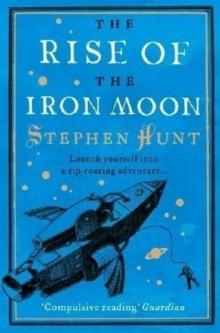 The Rise of the Iron Moon
The Rise of the Iron Moon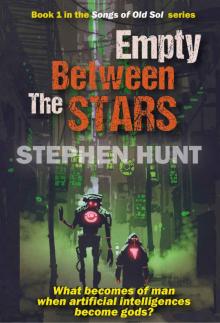 Empty Between the Stars (The Songs of Old Sol Book 1)
Empty Between the Stars (The Songs of Old Sol Book 1)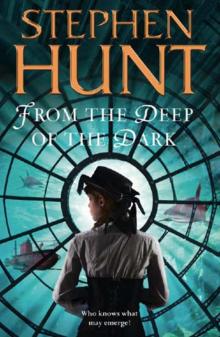 From the Deep of the Dark
From the Deep of the Dark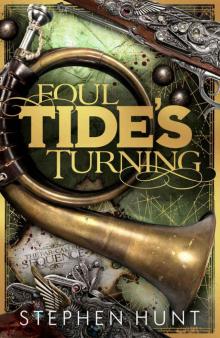 Foul Tide's Turning
Foul Tide's Turning Transference Station
Transference Station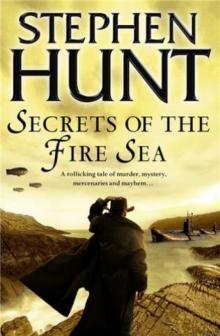 Secrets of the Fire Sea j-4
Secrets of the Fire Sea j-4 Void All The Way Down: The Sliding Void Omnibus
Void All The Way Down: The Sliding Void Omnibus The Kingdom Beyond the Waves j-2
The Kingdom Beyond the Waves j-2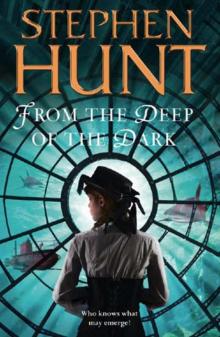 From the Deep of the Dark j-6
From the Deep of the Dark j-6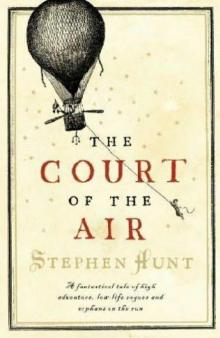 The Court of the Air
The Court of the Air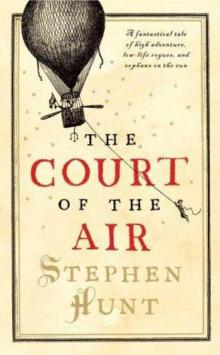 The Court of the Air j-1
The Court of the Air j-1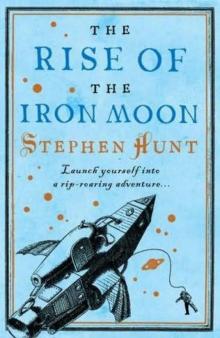 The rise of the Iron Moon j-3
The rise of the Iron Moon j-3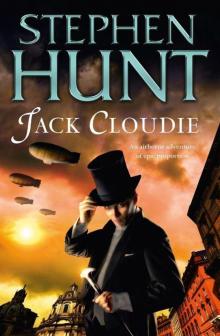 Jack Cloudie j-5
Jack Cloudie j-5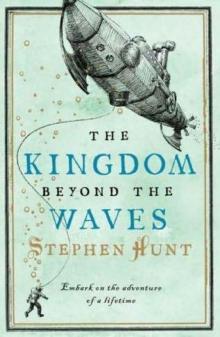 The Kingdom Beyond the Waves
The Kingdom Beyond the Waves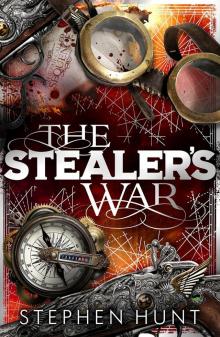 The Stealers' War
The Stealers' War In Dark Service
In Dark Service